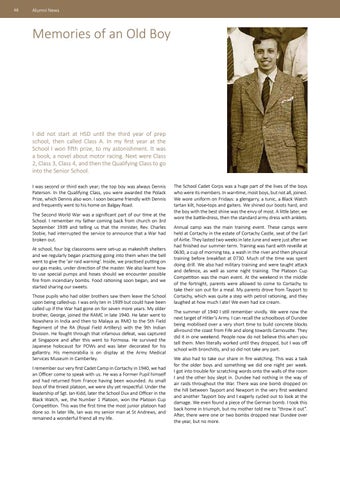48
Alumni News
Memories of an Old Boy
I did not start at HSD until the third year of prep school, then called Class A. In my first year at the School I won fifth prize, to my astonishment. It was a book, a novel about motor racing. Next were Class 2, Class 3, Class 4, and then the Qualifying Class to go into the Senior School. I was second or third each year; the top boy was always Dennis Paterson. In the Qualifying Class, you were awarded the Polack Prize, which Dennis also won. I soon became friendly with Dennis and frequently went to his home on Balgay Road. The Second World War was a significant part of our time at the School. I remember my father coming back from church on 3rd September 1939 and telling us that the minister, Rev. Charles Stobie, had interrupted the service to announce that a War had broken out. At school, four big classrooms were set-up as makeshift shelters and we regularly began practising going into them when the bell went to give the ‘air raid warning’. Inside, we practised putting on our gas masks, under direction of the master. We also learnt how to use special pumps and hoses should we encounter possible fire from incendiary bombs. Food rationing soon began, and we started sharing our sweets. Those pupils who had older brothers saw them leave the School upon being called-up. I was only ten in 1939 but could have been called up if the War had gone on for seven more years. My older brother, George, joined the RAMC in late 1940. He later went to Nowshera in India and then to Malaya as RMO to the 5th Field Regiment of the RA (Royal Field Artillery) with the 9th Indian Division. He fought through that infamous defeat, was captured at Singapore and after this went to Formosa. He survived the Japanese holocaust for POWs and was later decorated for his gallantry. His memorabilia is on display at the Army Medical Services Museum in Camberley. I remember our very first Cadet Camp in Cortachy in 1940, we had an Officer come to speak with us. He was a Former Pupil himself and had returned from France having been wounded. As small boys of the tiniest platoon, we were shy yet respectful. Under the leadership of Sgt. Ian Kidd, later the School Dux and Officer in the Black Watch, we, the Number 1 Platoon, won the Platoon Cup Competition. This was the first time the most junior platoon had done so. In later life, Ian was my senior man at St Andrews, and remained a wonderful friend all my life.
The School Cadet Corps was a huge part of the lives of the boys who were its members. In war-time, most boys, but not all, joined. We wore uniform on Fridays: a glengarry, a tunic, a Black Watch tartan kilt, hose-tops and gaiters. We shined our boots hard, and the boy with the best shine was the envy of most. A little later, we wore the battle-dress, then the standard army dress with anklets. Annual camp was the main training event. These camps were held at Cortachy in the estate of Cortachy Castle, seat of the Earl of Airlie. They lasted two weeks in late June and were just after we had finished our summer term. Training was hard with reveille at 0630, a cup of morning tea, a wash in the river and then physical training before breakfast at 0730. Much of the time was spent doing drill. We also had military training and were taught attack and defence, as well as some night training. The Platoon Cup Competition was the main event. At the weekend in the middle of the fortnight, parents were allowed to come to Cortachy to take their son out for a meal. My parents drove from Tayport to Cortachy, which was quite a step with petrol rationing, and they laughed at how much I ate! We even had ice cream. The summer of 1940 I still remember vividly. We were now the next target of Hitler’s Army. I can recall the schoolboys of Dundee being mobilised over a very short time to build concrete blocks all-round the coast from Fife and along towards Carnoustie. They did it in one weekend. People now do not believe this when you tell them. Men literally worked until they dropped, but I was off school with bronchitis, and so did not take any part. We also had to take our share in fire watching. This was a task for the older boys and something we did one night per week. I got into trouble for scratching words onto the walls of the room I and the other boy slept in. Dundee had nothing in the way of air raids throughout the War. There was one bomb dropped on the hill between Tayport and Newport in the very first weekend and another Tayport boy and I eagerly cycled out to look at the damage. We even found a piece of the German bomb. I took this back home in triumph, but my mother told me to “throw it out”. After, there were one or two bombs dropped near Dundee over the year, but no more.

























